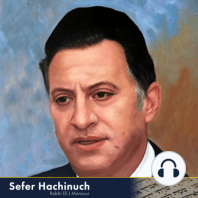20 min listen
Misva #419: Torah Study
FromSefer Hachinuch
ratings:
Length:
20 minutes
Released:
Mar 21, 2023
Format:
Podcast episode
Description
The Torah commands in Parashat Va’et’hanan (Debarim 6:7), “Ve’shinantam Le’banecha,” which literally means, “You shall teach them [the words of the Torah] to your children.” This verse is understood as introducing both the command to teach one’s children Torah, and to learn Torah oneself. The Sefer Ha’hinuch writes that the obligation to learn Torah consists of two components. First, we need to learn for the practical purpose of knowing our religious obligations, what precisely the Torah requires us to do and forbids us from doing. In addition, we have a separate obligation to be proficient in all of Torah, even those portions of Torah which are not directly relevant to practical observance. The word “Ve’shinantam” is understood to mean not only “teach,” but also as a command to be “sharp” (“Shenunim”), such that if somebody poses to us a question in Torah, we will have the answer readily accessible. Thus, we are required to learn Torah so that we know how to observe it, and also for the separate purpose of attaining Torah knowledge. The Sefer Ha’hinuch explains that the Torah is the expression of Hashem’s wisdom and the way He wants us to live, and so we are required to study the Torah in order to acquire this knowledge and wisdom. The command of “Ve’shinantam Le’banecha” requires one to teach Torah generally, to anybody, as the word “Banecha” (“your children”) can mean “your students.” However, this verse also is to be understood plainly, as requiring a father to teach his actual children Torah. The Sefer Ha’hinuch writes that when a young child is first able to speak, at around the age of three, the father must teach him the verse “Torah Siva Lanu Moshe, Morasha Kehilat Yaakob” (Debarim 33:4), and the verse “Shema Yisrael, Hashem Elokenu Hashem Ehad” (Debarim 6:4). When the child reaches the age when he can begin schooling – normally around the age of six – the father must send the child to be taught by teachers. The Sefer Ha’hinuch warns that when a child is still young and fragile, he should not be educationally burdened, as Torah learning requires effort and can be draining. A young child lacks the physical strength to handle a heavy burden of learning, and so his parents and teachers should not demand too much of him in terms of Torah study. Once he becomes older and stronger, however, he should be taught to apply himself in order to attain a complete Torah education. If a father fails to fulfill his obligation to provide his son with a Torah education, then the child’s grandfather bears this responsibility, and should teach the child at least the written Torah (Humash and Nach). If neither the father nor the grandfather taught a child Torah, then when the child becomes an adult, he must assume responsibility for his own Torah education. The Gemara in Masechet Kiddushin instructs that if this person can afford to either enroll in a yeshiva, or enroll his son in yeshiva, then he takes precedence over his son, unless his son is exceptionally gifted, in which case the son should be sent to yeshiva instead of the father. One is obligated to learn Torah throughout his life, even when he is very old, and even on his deathbed. This is inferred from the verse in the Book of Bamidbar (19:14), “Zot Ha’Torah, Adam Ki Yamut Ba’ohel” (literally, “This is the law concerning [a case where] a person dies in a tent”). This verse can be read to mean, “This is the Torah – even when a person is dying in a tent,” implying that even as one is about to die, he must learn Torah to the best of his ability. One is required to learn Torah regardless of whether he is rich or poor, healthy or ill. Nobody has an excuse not to spend time learning Torah. The Gemara (Yoma 35b) tells that Hillel was impoverished, but he nevertheless went to the Bet Midrash each day to learn Torah. Another great sage, Rabbi Elazar Ben Harsom, was exceptionally wealthy, with enormous amounts of assets around the world which occupied his time, but he nevertheless made time
Released:
Mar 21, 2023
Format:
Podcast episode
Titles in the series (100)
Misva #19: The Prohibition Against Eating Hametz on Pesach: Daily Sefer Hachinuch - Brought to you by itorah.com by Sefer Hachinuch
